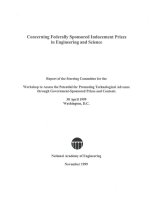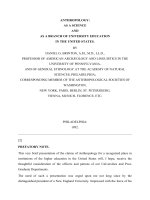Heart and science
Bạn đang xem bản rút gọn của tài liệu. Xem và tải ngay bản đầy đủ của tài liệu tại đây (1.44 MB, 352 trang )
TheProjectGutenbergEBookofHeartandScience,byWilkieCollins
ThiseBookisfortheuseofanyoneanywhereatnocostandwith
almostnorestrictionswhatsoever.Youmaycopyit,giveitawayor
re-useitunderthetermsoftheProjectGutenbergLicenseincluded
withthiseBookoronlineatwww.gutenberg.org
Title:HeartandScience
AStoryofthePresentTime
Author:WilkieCollins
ReleaseDate:July29,2009[EBook#7892]
LastUpdated:September11,2016
Language:English
***STARTOFTHISPROJECTGUTENBERGEBOOKHEARTANDSCIENCE***
ProducedbyJamesRusk,andDavidWidger
HEARTANDSCIENCE
AStoryofthePresentTime
ByWilkieCollins
TO SARONY (OF NEW YORK) ARTIST; PHOTOGRAPHER, AND GOOD
FRIEND
CONTENTS
I.PREFACETOREADERSINGENERAL
II.TOREADERSINPARTICULAR.
CHAPTERI.
CHAPTERII.
CHAPTERIII.
CHAPTERIV.
CHAPTERV.
CHAPTERVI.
CHAPTERVII.
CHAPTERVIII.
CHAPTERIX.
CHAPTERX.
CHAPTERXI.
CHAPTERXII.
CHAPTERXIII.
CHAPTERXIV.
CHAPTERXV.
CHAPTERXVI.
CHAPTERXVII.
CHAPTERXVIII.
CHAPTERXIX.
CHAPTERXX.
CHAPTERXXI.
CHAPTERXXII.
CHAPTERXXIII.
CHAPTERXXIV.
CHAPTERXXV.
CHAPTERXXVI.
CHAPTERXXVII.
CHAPTERXXVIII.
CHAPTERXXIX.
CHAPTERXXX.
CHAPTERXXXI.
CHAPTERXXXII.
CHAPTERXXXIII.
CHAPTERXXXIV.
CHAPTERXXXV.
CHAPTERXXXVI.
CHAPTERXXXVII.
CHAPTERXXXVIII.
CHAPTERXXXIX.
CHAPTERXL.
CHAPTERXLI.
CHAPTERXLII.
CHAPTERXLIII.
CHAPTERXLIV.
CHAPTERXLV.
CHAPTERXLVI.
CHAPTERXLVII.
CHAPTERXLVIII.
CHAPTERXLIX.
CHAPTERL.
CHAPTERLI.
CHAPTERLII.
CHAPTERLIII.
CHAPTERLIV.
CHAPTERLV.
CHAPTERLVI.
CHAPTERLVII.
CHAPTERLVIII.
CHAPTERLIX.
CHAPTERLX.
CHAPTERLXI.
CHAPTERLXII.
CHAPTERLXIII.
I.PREFACETOREADERSINGENERAL
You are the children of Old Mother England, on both sides of the Atlantic;
you form the majority of buyers and borrowers of novels; and you judge of
worksoffictionbycertaininbredpreferences,whichbutslightlyinfluencethe
othergreatpublicofreadersonthecontinentofEurope.
Thetwoqualitiesinfictionwhichholdthehighestrankinyourestimationare:
CharacterandHumour.Incidentanddramaticsituationonlyoccupythesecond
placeinyourfavour.Anovelthattellsnostory,orthatblundersperpetuallyin
tryingtotellastory—anovelsoentirelydevoidofallsenseofthedramaticside
ofhumanlife,thatnot even a theatricalthiefcanfindanythinginittosteal—
will nevertheless be a work that wins (and keeps) your admiration, if it has
Humourwhichdwellsonyourmemory,andcharacterswhichenlargethecircle
ofyourfriends.
Ihavemyselfalwaystriedtocombinethedifferentmeritsofagoodnovel,in
oneandthesamework;andIhaveneversucceededinkeepinganequalbalance.
Inthepresentstoryyouwillfindthescalesinclining,onthewhole,infavourof
characterandHumour.Thishasnothappenedaccidentally.
Advancingyears,andhealththatstandssadlyinneedofimprovement,warn
me—if I am to vary my way of work—that I may have little time to lose.
Withoutwaitingforfutureopportunities,Ihavekeptyourstandardofmeritmore
constantlybeforemymind,inwritingthisbook,thanonsomeformeroccasions.
Stillpersistingintellingyouastory—stillrefusingtogetupinthepulpitand
preach,ortoinvadetheplatformandlecture,ortotakeyoubythebuttonholein
confidence and make fun of my Art—it has been my chief effort to draw the
characterswithavigourandbreadthoftreatment,derivedfromthenearestand
truest view that I could get of the one model, Nature. Whether I shall at once
succeed in adding to the circle of your friends in the world of fiction—or
whether you will hurry through the narrative, and only discover on a later
readingthatitisthecharacterswhichhaveinterestedyouinthestory—remains
tobeseen.Eitherway,yoursympathywillfindmegrateful;for,eitherway,my
motivehasbeentopleaseyou.
During its periodical publication correspondents, noting certain passages in
“Heart and Science,” inquired how I came to think of writing this book. The
questionmaybereadilyansweredinbetterwordsthanmine.Mybookhasbeen
writteninharmony withopinionswhichhave anindisputable claimtorespect.
Letthemspeakforthemselves.
SHAKESPEARE’SOPINION.—“Itwasalwaysyetthetrickofour
Englishnation,iftheyhaveagoodthing,tomakeittoocommon.”
(KingHenryIV.,PartII.)
WALTERSCOTT’SOPINION—“Iamnogreatbelieverintheextreme
degreeofimprovementtobederivedfromtheadvancementofScience;for
everystudyofthatnaturetends,whenpushedtoacertainextent,to
hardentheheart.”(LettertoMissEdgeworth.)
FARADAY’SOPINION.—“Theeducationofthejudgmenthasforits
firstanditslaststep—Humility.”(LectureonMentalEducation,at
theRoyalInstitution.)
Havinggivenmyreasonsforwritingthebook,letmeconcludebytellingyou
whatIhavekeptoutofthebook.
It encourages me to think that we have many sympathies in common; and
among them, that most of us have taken to our hearts domestic pets. Writing
under this conviction, I have not forgotten my responsibility towards you, and
towardsmyArt,inpleadingthecauseoftheharmlessandaffectionatebeingsof
God’s creation. From first to last, you are purposely left in ignorance of the
hideous secrets of Vivisection. The outside of the laboratory is a necessary
objectinmylandscape—butIneveronceopenthedoorandinviteyoutolook
in.Itrace,inoneofmycharacters,theresultofthehabitualpracticeofcruelty
(nomatterunderwhatpretence)infatallydeterioratingthenatureofman—andI
leave the picture to speak for itself. My own personal feeling has throughout
beenheldincheck.ThankfullyacceptingtheassistancerenderedtomebyMiss
FrancesPowerCobbe,byMrs.H.M.Gordon,andbySurgeon-GeneralGordon,
C.B.,Ihaveborneinmind(astheyhaveborneinmind)thevalueoftemperate
advocacytoagoodcause.
Withthis,yourservantwithdraws,andleavesyoutothestory.
II.TOREADERSINPARTICULAR.
If you are numbered among those good friends of ours, who are especially
capableofunderstandingusandsympathisingwithus,bepleasedtoacceptthe
expressionofourgratitude,andtopassoverthelinesthatfollow.
But if you open our books with a mind soured by distrust; if you habitually
anticipate inexcusable ignorance where the course of the story happens to turn
onmattersoffact;itisyou,SirorMadam,whomInowwant.
Not to dispute with you—far from it! I own with sorrow that your severity
does occasionally encounter us on assailable ground. But there are exceptions,
eventothestiffestrules.Someofusarenotguiltyofwilfulcarelessness:some
ofusapplytocompetentauthority,whenwewriteonsubjectsbeyondtherange
ofourownexperience.Havingthusfarventuredtospeakformycolleagues,you
will conclude that I am paving the way for speaking next of myself. As our
cousinsintheUnitedStatessay—thatisso.
Inthefollowingpages,thereareallusionstomedicalpracticeatthebedside;
leadinginduecoursetophysiologicalquestionswhichconnectthemselveswith
the main interest of the novel. In traversing this delicate ground, you have not
been forgotten. Before the manuscript went to the printer, it was submitted for
correction to an eminent London surgeon, whose experience extends over a
periodoffortyyears.
Again:asupposeddiscoveryinconnectionwithbraindisease,whichoccupies
a place of importance, is not (as you may suspect) the fantastic product of the
author’simagination.Findinghismaterialseverywhere,hehasevencontrivedto
make use of Professor Ferrier—writing on the “Localisation of Cerebral
Disease,” and closing a confession of the present result of post-mortem
examinationofbrainsinthesewords:“Wecannotevenbesure,whethermanyof
thechangesdiscoveredarethecauseortheresultoftheDisease,orwhetherthe
twoaretheconjointresultsofacommoncause.”Plentyofelbowroomherefor
thespiritofdiscovery.
Onbecomingacquaintedwith“Mrs.Gallilee,”youwillfindhertalking—and
you will sometimes even find the author talking—of scientific subjects in
general.Youwillnaturallyconcludethatitis“allgrosscaricature.”No;itisall
promiscuous reading. Let me spare you a long list of books consulted, and of
newspapers and magazines mutilated for “cuttings”—and appeal to examples
oncemore,andforthelasttime.
When “Mrs. Gallilee” wonders whether “Carmina has ever heard of the
DiathermancyofEbonite,”sheisthinkingofproceedingsataconversazionein
honour of Professor Helmholtz (reported in the Times of April 12, 1881), at
which“radiantenergy”wasindeedconvertedinto“sonorousvibrations.”Again:
whenshecontemplatestakingpartinadiscussiononMatter,shehasbeenslily
lookingintoChambers’sEncyclopaedia,andhastherediscoveredtheinteresting
conditions on which she can “dispense with the idea of atoms.” Briefly, not a
wordofmyowninventionoccurs,whenMrs.Gallileeturnsthelearnedsideof
hercharactertoyourworships’view.
Ihavenowonlytoaddthatthestoryhasbeensubjectedtocarefulrevision,
andIhopetoconsequentimprovement,initspresentformofpublication.Past
experiencehasshownmethatyouhaveasharpeyeforslipsofthepen,andthat
youthoroughlyenjoyconvictinganovelist,bypost,ofhavingmadeamistake.
WhateverpainsImayhavetakentodisappointyou,itisquitelikelythatwemay
be again indebted to each other on this occasion. So, to our infinite relief on
eitherside,wepartfriendsafterall.
W.C.
London:April1883
CHAPTERI.
Thewearyoldnineteenthcenturyhadadvancedintothelasttwentyyearsof
itslife.
Towards two o’clock in the afternoon, Ovid Vere (of the Royal College of
Surgeons)stoodatthewindowofhisconsulting-roominLondon,lookingoutat
thesummersunshine,andthequietdustystreet.
Hehadreceivedawarning,familiartothebusymenofourtime—thewarning
from overwrought Nature, which counsels rest after excessive work. With a
prosperouscareerbeforehim,hehadbeencompelled(atonlythirty-oneyearsof
age)toaskacolleaguetotakechargeofhispractice,andtogivethebrainwhich
hehadcruellyweariedarestofsomemonthstocome.Onthenextdayhehad
arrangedtoembarkfortheMediterraneaninafriend’syacht.
Anactiveman,devotedheartandsoultohisprofession,isnotamanwhocan
learnthehappyknackofbeingidleatamoment’snotice.Ovidfoundthemere
actoflookingoutofwindow,andwonderingwhatheshoulddonext,morethan
hehadpatiencetoendure.
Heturnedtohisstudytable.Ifhehadpossessedawifetolookafterhim,he
wouldhavebeenremindedthatheandhisstudytablehadnothingincommon,
under present circumstances. Being deprived of conjugal superintendence, he
brokethoughhisownrules.Hisrestlesshandunlockedadrawer,andtookouta
manuscriptworkonmedicineofhisownwriting.“Surely,”hethought,“Imay
finishachapter,beforeIgotoseato-morrow?”
Hishead,steadyenoughwhilehewasonlylookingoutofwindow,beganto
swim before he had got to the bottom of a page. The last sentences of the
unfinishedchapteralludedtoamatteroffactwhichhehadnotyetverified.In
emergencies of any sort, he was a patient man and a man of resource. The
necessary verification could be accomplished by a visit to the College of
Surgeons, situated in the great square called Lincoln’s Inn Fields. Here was a
motiveforawalk—withanoccupationattheendofit,whichonlyinvolveda
question to a Curator, and an examination of a Specimen. He locked up his
manuscript,andsetforthforLincoln’sInnFields.
CHAPTERII.
Whentwofriendshappentomeetinthestreet,dotheyeverlookbackalong
the procession of small circumstances which has led them both, from the
starting-pointoftheirownhouses,tothesamespot,atthesametime?Notone
man in ten thousand has probably ever thought of making such a fantastic
inquiry as this. And consequently not one man in ten thousand, living in the
midstofreality,hasdiscoveredthatheisalsolivinginthemidstofromance.
From the moment when the young surgeon closed the door of his house, he
waswalkingblindfoldonhiswaytoapatientinthefuturewhowaspersonally
still a stranger to him. He never reached the College of Surgeons. He never
embarkedonhisfriend’syacht.
Whatweretheobstacleswhichturnedhimasidefromthecoursethathehad
in view? Nothing but a series of trivial circumstances, occurring in the
experienceofamanwhogoesoutforawalk.
He had only reached the next street, when the first of the circumstances
presenteditselfintheshapeofafriend’scarriage,whichdrewupathisside.A
bright benevolent face encircled by bushy white whiskers, looked out of the
window,andaheartyvoiceaskedhimifhehadcompletedhisarrangementsfor
alongholiday.Havingrepliedtothis,Ovidhadaquestiontoput,onhisside.
“Howisourpatient,SirRichard?”
“Outofdanger.”
“Andwhatdotheotherdoctorssaynow?”
SirRichardlaughed:“Theysayit’smyluck.”
“Notconvincedyet?”
“Not in the least. Who has ever succeeded in convincing fools? Let’s try
anothersubject.Isyourmotherreconciledtoyournewplans?”
“Icanhardlytellyou.Mymotherisinastateofindescribableagitation.Her
brother’sWillhasbeenfoundinItaly.AndhisdaughtermayarriveinEnglandat
amoment’snotice.”
“Unmarried?”SirRichardaskedslyly.
“Idon’tknow.”
“Anymoney?”
Ovid smiled—not cheerfully. “Do you think my poor mother would be in a
stateofindescribableagitationiftherewasnotmoney?”
SirRichardwasoneofthoseobsoleteelderlypersonswhoquoteShakespeare.
“Ah, well,” he said, “your mother is like Kent in King Lear—she’s too old to
learn. Is she as fond as ever of lace? and as keen as ever after a bargain?” He
handed a card out of the carriage window. “I have just seen an old patient of
mine,” he resumed, “in whom I feel a friendly interest. She is retiring from
businessbymyadvice;andsheasksme,ofallthepeopleintheworld,tohelp
heringettingridofsomewonderful‘remnants,’at‘analarmingsacrifice!’My
kindregardstoyourmother—andthere’sachanceforher.Onelastword,Ovid.
Don’t be in too great a hurry to return to work; you have plenty of spare time
beforeyou.Lookatmywisedoghere,onthefrontseat,andlearnfromhimto
beidleandhappy.”
Thegreatphysicianhadanothercompanion,besideshisdog.Afriend,bound
his way, had accepted a seat in the carriage. “Who is that handsome young
man?”thefriendaskedastheydroveaway.
“Heistheonlysonofarelativeofmine,deadmanyyearssince,”SirRichard
replied.“Don’tforgetthatyouhaveseenhim.”
“MayIaskwhy?”
“Hehasnotyetreachedtheprimeoflife;andheisontheway—alreadyfar
ontheway—tobeoneoftheforemostmenofhistime.Withaprivatefortune,
he has worked as few surgeons work who have their bread to get by their
profession.Themoneycomesfromhislatefather.Hismotherhasmarriedagain.
Thesecondhusbandisalazy,harmlessoldfellow,namedGallilee;possessedof
onesmallattraction—fiftythousandpounds,grubbedupintrade.Therearetwo
little daughters, by the second marriage. With such a stepfather as I have
described,and,betweenourselves,withamotherwhohasrathermorethanher
fair share of the jealous, envious, and money-loving propensities of humanity,
myfriendOvidisnotdivertedbyfamilyinfluencesfromtheclosepursuitofhis
profession.Youwilltellme,hemaymarry.Well!ifhegetsagoodwifeshewill
beacircumstanceinhisfavour.But,sofarasIknow,heisnotthatsortofman.
Cooler,adealcooler,withwomenthanIam—thoughIamoldenoughtobehis
father.Letusgetbacktohisprofessionalprospects.Youheardhimaskmeabout
apatient?”
“Yes.”
“Very good. Death was knocking hard at that patient’s door, when I called
Ovidintoconsultationwithmyselfandwithtwootherdoctorswhodifferedwith
me.Itwasoneoftheveryrarecasesinwhichtheoldpracticeofbleedingwas,
tomymind,theonlytreatmenttopursue.Inevertoldhimthatthiswasthepoint
indisputebetweenmeandtheothermen—andtheysaidnothing,ontheirside,
at my express request. He took his time to examine and think; and he saw the
chanceofsavingthepatientbyventuringontheuseofthelancetasplainlyasI
did—with my forty years’ experience to teach me! A young man with that
capacityfordiscoveringtheremotecauseofdisease,andwiththatsuperiorityto
the trammels of routine in applying the treatment, has no common medical
careerbeforehim.Hisholidaywillsethishealthrightinnexttonotime.Isee
nothinginhisway,atpresent—notevenawoman!But,”saidSirRichard,with
the explanatory wink of one eye peculiar (like quotation from Shakespeare) to
personsoftheobsoleteoldtime,“weknowbetterthantoforecasttheweatherif
apetticoatinfluenceappearsonthehorizon.Oneprediction,however,Idorisk.
If his mother buys any of that lace—I know who will get the best of the
bargain!”
Theconditionsunderwhichtheolddoctorwaswillingtoassumethecharacter
ofaprophetneveroccurred.Ovidrememberedthathewasgoingawayonalong
voyage—andOvidwasagoodson.Heboughtsomeofthelace,asapresentto
hismotheratparting;and,mostassuredly,hegottheworstofthebargain.
His shortest way back to the straight course, from which he had deviated in
makinghispurchase,ledhimintoaby-street,neartheflowerandfruitmarketof
Covent Garden. Here he met with the second in number of the circumstances
whichattendedhiswalk.Hefoundhimselfencounteredbyanintolerablyfilthy
smell.
ThemarketwasnotoutofthedirectwaytoLincoln’sInnFields.Hefledfrom
thesmelltothefloweryandfruityperfumesofCoventGarden,andcompleted
thedisinfectingprocessbymeansofabasketofstrawberries.
Whydidapoorraggedlittlegirl,carryingabigbaby,lookwithsuchlonging
eyesatthedeliciousfruit,that,asakind-heartedman,hehadnoalternativebut
tomakeherapresentofthestrawberries?Whydidtwodirtyboyfriendsofhers
appearimmediatelyafterwardswithnewsofPunchinaneighbouringstreet,and
lead the little girl away with them? Why did these two new circumstances
inspirehimwithafearthattheboysmighttakethestrawberriesawayfromthe
poorchild,burdenedasshewaswithababyalmostasbigasherself?Whenwe
suffer from overwrought nerves we are easily disturbed by small misgivings.
The idle man of wearied mind followed the friends of the street drama to see
whathappened,forgetfuloftheCollegeofSurgeons,andfindinganewfundof
amusementinhimself.
Arrivedintheneighbouringstreet,hediscoveredthatthePunchperformance
had come to an end—like some other dramatic performances of higher
pretensions—for want of a paying audience. He waited at a certain distance,
watching the children. His doubts had done them an injustice. The boys only
said, “Give us a taste.” And the liberal little girl rewarded their good conduct.
An equitable and friendly division of the strawberries was made in a quiet
corner.
Where—alwaysexceptingthecaseofamiseroramillionaire—isthemanto
befoundwhocouldhavereturnedtothepursuitofhisownaffairs,underthese
circumstances,withoutencouragingthepracticeofthesocialvirtuesbyapresent
ofafewpennies?Ovidwasnotthatman.
Puttingbackinhisbreast-pocketthebaginwhichhewasaccustomedtocarry
small coins for small charities, his hand touched something which felt like the
envelope of a letter. He took it out—looked at it with an expression of
annoyance and surprise—and once more turned aside from the direct way to
Lincoln’sInnFields.
The envelopecontainedhislastprescription.Having occasiontoconsultthe
“Pharmacopoeia,”hehadwrittenitathome,andhadpromisedtosendittothe
patient immediately. In the absorbing interest of making his preparations for
leaving England, it had remained forgotten in his pocket for nearly two days.
Theonemeansofsettingthisunluckyerrorright,withoutfurtherdelay,wasto
deliver his prescription himself, and to break through his own rules for the
secondtimebyattendingtoacaseofillness—purelyasanactofatonement.
The patient lived in a house nearly opposite to the British Museum. In this
northwarddirectionhenowsethisface.
Hemadehisapologies,andgavehisadvice—and,gettingoutagainintothe
street,triedoncemoretoshapehiscoursefortheCollegeofSurgeons.Passing
the walled garden of the British Museum, he looked towards it—and paused.
Whathadstoppedhim,thistime?Nothingbutatree,flutteringitsbrightleaves
inthefaintsummerair.
Amarkedchangeshoweditselfinhisface.
The moment before he had been passing in review the curious little
interruptionswhichhadattendedhiswalk,andhadwonderedhumorouslywhat
would happen next. Two women, meeting him, and seeing a smile on his lips,
hadsaidtoeachother,“Theregoesahappyman.”Iftheyhadencounteredhim
now, they might have reversed their opinion. They would have seen a man
thinkingofsomethingoncedeartohim,inthefarandunforgottenpast.
Hecrossedovertheroadtotheside-streetwhichfacedthegarden.Hishead
drooped; he moved mechanically. Arrived in the street, he lifted his eyes, and
stood(withinnearerviewofit)lookingatthetree.
Hundreds of miles away from London, under another tree of that gentle
family, this man—so cold to women in after life—had made child-love, in the
daysofhisboyhood,toasweetlittlecousinlongsincenumberedwiththedead.
Thepresenttime,withitsinterestsandanxieties,passedawaylikethepassingof
adream.Littlebylittle,astheminutesfollowedeachother,hissoreheartfelta
calming influence, breathed mysteriously from the fluttering leaves. Still
forgetful of the outward world, he wandered slowly up the street; living in the
oldscenes;thinking,notunhappilynow,theoldthoughts.
Where, in all London, could he have found a solitude more congenial to a
dreamerindaylight?
The broad district, stretching northward and eastward from the British
Museum, is like the quiet quarter of a country town set in the midst of the
roaringactivitiesofthelargestcityintheworld.Here,youcancrosstheroad,
without putting limb or life in peril. Here, when you are idle, you can saunter
andlookabout,safefromcollisionwithmercilessstraight-walkerswhosetimeis
money,andwhosedestinyisbusiness.Here,youmaymeetundisturbedcatson
thepavement,inthefullglareofnoontide,andmaywatch,throughtherailings
ofthesquares,childrenatplayongrassthatalmostglowswiththelustreofthe
Sussex Downs. This haven of rest is alike out of the way of fashion and
business;andisyetwithineasyreachoftheoneandtheother.Ovidpausedina
vastandsilentsquare.Ifhislittlecousinhadlived,hemightperhapshaveseen
hischildrenatplayinsomesuchsecludedplaceasthis.
Thebirdsweresingingblithelyinthetrees.Atradesman’sboy,deliveringfish
to the cook, and two girls watering flowers at a window, were the only living
creaturesnearhim,asherousedhimselfandlookedaround.
Where was the College? Where were the Curator and the Specimen? Those
questions brought with them no feeling of anxiety or surprise. He turned, in a
half-awakenedway,withoutawishorapurpose—turned,andlistlesslylooked
back.
Two foot-passengers, dressed in mourning garments, were rapidly
approaching him. One of them, as they came nearer, proved to be an aged
woman.Theotherwasagirl.
He drew aside to let them pass. They looked at him with the lukewarm
curiosity of strangers, as they went by. The girl’s eyes and his met. Only the
glanceofaninstant—anditsinfluenceheldhimforlife.
She went swiftly on, as little impressed by the chance meeting as the old
womanatherside.Withoutstoppingtothink—withoutbeingcapableofthought
—Ovid followed them. Never before had he done what he was doing now; he
was, literally, out of himself. He saw them ahead of him, and he saw nothing
else.
Towardsthemiddleofthesquare,theyturnedasideintoastreetontheleft.A
concert-hall was in the street—with doors open for an afternoon performance.
Theyenteredthehall.Stilloutofhimself,Ovidfollowedthem.
CHAPTERIII.
A room of magnificent size; furnished with every conventional luxury that
money can buy; lavishly provided with newspapers and books of reference;
lighted by tall windows in the day-time, and by gorgeous chandeliers at night,
may be nevertheless one of the dreariest places of rest and shelter that can be
found on the civilised earth. Such places exist, by hundreds, in those hotels of
monstrousproportionsandpretensions,whichnowengulfthetravellerwhoends
his journey on the pier or the platform. It may be that we feel ourselves to be
strangersamongstrangers—itmaybethatthereissomethinginnatelyrepellent
in splendid carpets and curtains, chairs and tables, which have no social
associations to recommend them—it may be that the mind loses its elasticity
undertheinevitablerestraintonfriendlycommunication,whichexpressesitself
inloweredtonesandinstinctivedistrustofournextneighbour;butthisaloneis
certain: life, in the public drawing-room of a great hotel, is life with all its
healthiestemanationsperishinginanexhaustedreceiver.
Onthesameday,andnearlyatthesamehour,whenOvidhadlefthishouse,
twowomensatinacornerofthepublicroom,inoneofthelargestoftherailway
hotelslatterlybuiltinLondon.
Withoutobservingitthemselves,theywereobjectsofcuriositytotheirfellowtravellers.Theyspoketoeachotherinaforeignlanguage.Theyweredressedin
deepmourning—withanabsenceoffashionandasimplicityofmaterialwhich
attractedthenoticeofeveryotherwomanintheroom.Oneofthemworeablack
veiloverhergrayhair.Herhandswerebrown,andknottyatthejoints;hereyes
looked unnaturally bright for her age; innumerable wrinkles crossed and recrossedherskinnyface;andheraquilinenose(asoneoftheladiespresenttook
occasion to remark) was so disastrously like the nose of the great Duke of
Wellingtonastobeanoffensivefeatureinthefaceofawoman.
The lady’s companion, being a man, took a more merciful view. “She can’t
helpbeingugly,”hewhispered.“Butseehowshelooksatthegirlwithher.A
goodoldcreature,Isay,ifevertherewasoneyet.”Theladyeyedhim,asonlya
jealouswomancaneyeherhusband,andwhisperedback,“Ofcourseyou’rein
lovewiththatslipofagirl!”
Shewasaslipofagirl—andnotevenatallslip.Atseventeenyearsofage,it
wasdoubtfulwhethershewouldevergrowtoabetterheight.
Butagirlwhoistoothin,andnotevensotallastheVenusde’Medici,may
still be possessed of personal attractions. It was not altogether a matter of
certainty,inthiscase,thattheattractionsweresufficientlyremarkabletoexcite
general admiration. The fine colour and the plump healthy cheeks, the broad
smile,andtheregularteeth,thewell-developedmouth,andthepromisingbosom
which form altogether the average type of beauty found in the purely bred
Englishmaiden,werenotamongthenoticeablecharmsofthesmallcreaturein
gloomyblack,shrinkingintoacornerofthebigroom.Shehadverylittlecolour
ofanysorttoboastof.Herhairwasofsolightabrownthatitjustescapedbeing
flaxen;butithadthenegativemeritofnotbeingforceddowntohereyebrows,
and twisted into the hideous curly-wig which exhibits a liberal equality of
ugliness on the heads of women in the present day. There was a delicacy of
finish in her features—in the nose and the lips especially—a sensitive
changefulnessintheexpressionofhereyes(toodarkinthemselvestobequitein
harmonywithherlighthair),andasubtleyetsimplewitcheryinherraresmile,
whichatoned,insomedegreeatleast,forwantofcomplexioninthefaceandof
flesh in the figure. Men might dispute her claims to beauty—but no one could
deny that she was, in the common phrase, an interesting person. Grace and
refinement;aquicknessofapprehensionandavivacityofmovement,suggestive
of some foreign origin; a childish readiness of wonder, in the presence of new
objects—andperhaps,underhappiercircumstances,achildishplayfulnesswith
persons whom she loved—were all characteristic attractions of the modest
strangerwhowasinthechargeoftheuglyoldwoman,andwhowaspalpably
theobjectofthatwrinkledduenna’sdevotedlove.
A travelling writing-case stood open on a table near them. In an interval of
silencethegirllookedatitreluctantly.Theyhadbeentalkingoffamilyaffairs—
andhadspokeninItalian,soastokeeptheirdomesticsecretsfromtheearsof
the strangers about them. The old woman was the first to resume the
conversation.
“MyCarmina,youreallyoughttowritethatletter,”shesaid;“theillustrious
Mrs.GallileeiswaitingtohearofourarrivalinLondon.”
Carminatookupthepen,andputitdownagainwithasigh.“Weonlyarrived
last night,” she pleaded. “Dear old Teresa, let us have one day in London by
ourselves!”
Teresareceivedthisproposalwithundisguisedamazementandalarm,
“Jesu Maria! a day in London—and your aunt waiting for you all the time!
Sheisyoursecondmother,mydear,byappointment;andherhouseisyournew
home.Andyouproposetostopawholedayatanhotel,insteadofgoinghome.
Impossible! Write, my Carmina—write. See, here is the address on a card:
—‘FairfieldGardens.’Whataprettyplaceitmustbetolivein,withsuchaname
asthat!Andasweetlady,nodoubt.Come!Come!”
ButCarminastillresisted.“Ihaveneverevenseenmyaunt,”shesaid.“Itis
dreadfultopassmylifewithastranger.Remember,Iwasonlyachildwhenyou
cametousaftermymother’sdeath.ItishardlysixmonthsyetsinceIlostmy
father.Ihavenoonebutyou,and,whenIgotothisnewhome,youwillleave
me.Ionlyaskforonemoredaytobetogether,beforewepart.”
Thepooroldduennadrewbackoutofsight,intheshadowofacurtain—and
begantocry.Carminatookherhand,undercoverofatablecloth;Carminaknew
how to console her. “We will go and see sights,” she whispered “and, when
dinner-timecomes,youshallhaveaglassofthePorto-porto-wine.”
Teresa looked round out of the shadow, as easily comforted as a child.
“Sights!”sheexclaimed—anddriedhertears.“Porto-porto-wine!”sherepeated
—andsmackedherwitheredlipsattherelishingwords.“Ah,mychild,youhave
notforgottentheconsolationsItoldyouof,whenIlivedinLondoninmyyoung
days. To think of you, with an English father, and never in London till now! I
usedtogotomuseumsandconcertssometimes,whenmyEnglishmistresswas
pleased with me. That gracious lady often gave me a glass of the fine strong
purplewine.TheHolyVirgingrantthatAuntGallileemaybeaskindawoman!
Such a head of hair as the other one she cannot hope to have. It was a joy to
dressit.DoyouthinkIwouldn’tstayhereinEnglandwithyouifIcould?What
istobecomeofmyoldmaninItaly,withhiscursedasthma,andnobodytonurse
him? Oh, but those were dull years in London! The black endless streets—the
dreadful Sundays—the hundreds of thousands of people, always in a hurry;
alwayswithgrimfacessetonbusiness,business,business!Iwasgladtogoback
andbemarriedinItaly.AndhereIaminLondonagain,afterGodknowshow
many years. No matter. We will enjoy ourselves to-day; and when we go to
MadamGallilee’sto-morrow,wewilltellalittlelie,andsayweonlyarrivedon
theeveningthathasnotyetcome.”
Theduenna’ssenseofhumourwassotickledbythisprospectiveviewofthe
little lie, that she leaned back in her chair and laughed. Carmina’s rare smile
showed itself faintly. The terrible first interview with the unknown aunt still
oppressedher.Shetookupanewspaperindespair.“Oh,myolddear!”shesaid,
“letusgetoutofthisdreadfulroom,andberemindedofItaly!”Teresaliftedher
uglyhandsinbewilderment.“RemindedofItaly—inLondon?”
“IstherenoItalianmusicinLondon?”Carminaaskedsuggestively.
Theduenna’sbrighteyesansweredthisintheirownlanguage.Shesnatched
upthenearestnewspaper.
ItwasthentheheightoftheLondonconcertseason.Morningperformancesof
music were announced in rows. Reading the advertised programmes, Carmina
found them, in one remarkable respect, all alike. They would have led an
ignorant stranger to wonder whether any such persons as Italian composers,
Frenchcomposers,andEnglishcomposershadeverexisted.Themusicoffered
to the English public was music of exclusively German (and for the most part
modern German) origin. Carmina held the opinion—in common with Mozart
andRossini,aswellasotherpeople—thatmusicwithoutmelodyisnotmusicat
all.Shelaidasidethenewspaper.
The plan of going to a concert being thus abandoned, the idea occurred to
themofseeingpictures.Teresa,insearchofinformation,triedherluckatagreat
tableinthemiddleoftheroom,onwhichusefulbookswereliberallydisplayed.
ShereturnedwithacatalogueoftheRoyalAcademyExhibition(whichsomeone
had left on the table), and with the most universally well-informed book, on a
small scale, that has ever enlightened humanity—modestly described on the
title-pageasanAlmanac.
Carminaopenedthecatalogueatthefirstpage,anddiscoveredalistofRoyal
Academicians.Wereallthesegentlemencelebratedpainters?Outofnearlyforty
names, three only had made themselves generally known beyond the limits of
England.Sheturnedtothelastpage.Theworksofartonshownumberedmore
than fifteen hundred. Teresa, looking over her shoulder, made the same
discovery.“Ourheadswillache,andourfeetwillache,”sheremarked,“before
wegetoutofthatplace.”Carminalaidasidethecatalogue.
Teresa opened the Almanac at hazard, and hit on the page devoted to
Amusements. Her next discovery led her to the section inscribed “Museums.”
Shescoredanapprovingmarkatthatplacewithherthumbnail—andreadthelist
influentbrokenEnglish.
TheBritishMuseum?Teresa’smemoryofthatmagnificentbuildingrecalledit
vividly in one respect. She shook her head. “More headache and footache,
there!”BethnalGreen;IndianMuseum;CollegeofSurgeons;PracticalGeology;
SouthKensington;PatentMuseum—allunknowntoTeresa.“Thesaintspreserve
us! what headaches and footaches in all these, if they are as big as that other
one!” She went on with the list—and astonished everybody in the room by
suddenly clapping her hands. Sir John Soane’s Museum, Lincoln’s Inn Fields.
“Ah,butIrememberthat!Anicelittleeasymuseuminaprivatehouse,andall
sorts of pretty things to see. My dear love, trust your old Teresa. Come to
Soane!”
In ten minutes more they were dressed, and on the steps of the hotel. The
bright sunlight, the pleasant air, invited them to walk. On the same afternoon,
whenOvidhadsetforthonfootforLincoln’sInnFields,CarminaandTeresaset
forthonfootforLincoln’sInnFields.Trivialobstacleshadkeptthemanaway
from the College. Would trivial obstacles keep the women away from the
Museum?
TheycrossedtheStrand,andenteredastreetwhichledoutofittowardsthe
North;Teresa’sprideinhermemoryforbiddingherthusfartoasktheirway.
Theirtalk—dwellingatfirstonItaly,andonthememoryofCarmina’sItalian
mother—reverted to the formidable subject of Mrs. Gallilee. Teresa’s hopeful
viewofthefutureturnedtothecousins,anddrewthepictureoftwocharming
little girls, eagerly waiting to give their innocent hearts to their young relative
fromItaly.“Arethereonlytwo?”shesaid.“Surelyyoutoldmetherewasaboy,
besidesthegirls?”Carminasetherright.“MycousinOvidisagreatdoctor,”she
continued with an air of importance. “Poor papa used to say that our family
wouldhavereasontobeproudofhim.”“Doesheliveathome?”askedsimple
Teresa.“Oh,dear,no!Hehasagrandhouseofhisown.Hundredsofsickpeople
gotheretobecured,andgivehundredsofgoldenguineas.”Hundredsofgolden
guineas gained by only curing sick people, represented to Teresa’s mind
something in the nature of a miracle: she solemnly raised her eyes to heaven.
“Whatacousintohave!Isheyoung?ishehandsome?ishemarried?”
Instead of answering these questions, Carmina looked over her shoulder. “Is
thispoorcreaturefollowingus?”sheasked.
They had now turned to the right, and had entered a busy street leading
directly to Covent Garden. The “creature” (who was undoubtedly following
them) was one of the starved and vagabond dogs of London. Every now and
then, the sympathies of their race lead these inveterate wanderers to attach
themselves, for the time, to some human companion, whom their mysterious
insight chooses from the crowd. Teresa, with the hard feeling towards animals
whichisoneoftheseriousdefectsoftheItaliancharacter,cried,“Ah,themangy
beast!” and lifted her umbrella. The dog starred back, waited a moment, and
followedthemagainastheywenton.
Carmina’sgentleheartgaveitspitytothislostandhungryfellow-creature.“I
mustbuythatpoordogsomethingtoeat,”shesaid—andstoppedsuddenlyasthe
ideastruckher.
Thedog,accustomedtokicksandcurses,wasignorantofkindness.Following
close behind her, when she checked herself, he darted away in terror into the
road.Acabwasdrivenbyrapidlyatthesamemoment.Thewheelpassedover
the dog’s neck. And there was an end, as a man remarked looking on, of the
troublesofacur.
Thiscommonaccidentstruckthegirl’ssensitivenaturewithhorror.Helpless
andspeechless,shetrembledpiteously.Thenearestopendoorwasthedoorofa
music-seller’sshop.Teresaledherin,andaskedforachairandaglassofwater.
Theproprietor,feelingtheinterestinCarminawhichsheseldomfailedtoinspire
among strangers, went the length of offering her a glass of wine. Preferring
water,shesoonrecoveredherselfsufficientlytobeabletoleaveherchair.
“May I change my mind about going to the museum?” she said to her
companion. “After what has happened, I hardly feel equal to looking at
curiosities.”
Teresa’s ready sympathy tried to find some acceptable alternative. “Music
wouldbebetter,wouldn’tit?”shesuggested.
The so-called Italian Opera was open that night, and the printed
announcement of the performance was in the shop. They both looked at it.
Fortune was still against them. A German opera appeared on the bill. Carmina
turnedtothemusic-sellerindespair.“Istherenomusic,sir,butGermanmusicto
beheardinLondon?”sheasked.Thehospitableshopkeeperproducedaconcert
programmedforthatafternoon—themodestenterpriseofanobscurepiano-forte
teacher,whocouldonlyventuretoaddresspupils,patrons,andfriends.Whatdid
he promise? Among other things, music from “Lucia,” music from “Norma,”
musicfrom“Ernani.”Teresamadeanotherapprovingmarkwithherthumb-nail;
andCarminapurchasedtickets.
The music-seller hurried to the door to stop the first empty cab that might
pass.Carminashowedadeplorableignoranceofthelawofchances.Sheshrank
from the bare idea of getting into a cab. “We may run over some other poor
creature,”shesaid.“Ifitisn’tadog,itmaybeachildnexttime.”Teresaandthe
music-seller suggested a more reasonable view as gravely as they could.
Carmina humbly submitted to the claims of common sense—without yielding,
for all that. “I know I’m wrong,” she confessed. “Don’t spoil my pleasure; I
can’tdoit!”
The strange parallel was now complete. Bound for the same destination,
CarminaandOvidhadfailedtoreachitalike.AndCarminahadstoppedtolook
at the garden of the British Museum, before she overtook Ovid in the quiet
square.









